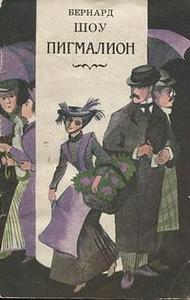You need to sign in or sign up before continuing.
Take a photo of a barcode or cover
funny
hopeful
inspiring
lighthearted
reflective
fast-paced
Plot or Character Driven:
Character
Strong character development:
Yes
Loveable characters:
Complicated
Diverse cast of characters:
Yes
Flaws of characters a main focus:
Yes
Graphic: Bullying, Misogyny, Gaslighting, Toxic friendship, Classism
Moderate: Emotional abuse, Abandonment
Minor: Child abuse, Cursing, Death of parent
emotional
informative
tense
medium-paced
Plot or Character Driven:
Character
Strong character development:
Complicated
Loveable characters:
Complicated
Diverse cast of characters:
N/A
Flaws of characters a main focus:
Yes
First of all, Audrey Hepburn and Rex Harrison make an amazing Doolittle and Higgins. (I know Julie Andrews should have been Eliza, but that's not how it turned out, and I love Audrey, so there.) I love classics, and I love My Fair Lady, so I thought I might as well give this book a try. I was very pleased with it, actually. Not much of a surprise, since I've seen the movie thousands of times, but the familiarity of it made reading that much more enjoyable. I think the biggest difference between the play and the movie is the fact that Henry Higgins is a total jerkface in the original. Not that he isn't a little rude in the new movie, but at least he gets better... The character in the original play is definitely flawed. Eliza too, I guess.
Good play. I would definitely recommend reading it, if you get a chance.
Good play. I would definitely recommend reading it, if you get a chance.
More accurately 2.5.
There are some fun and quirky moments, but this really doesn't age well, and I don't feel as though any of the good moments justify the misogyny. At least I'm satisfied that Shaw was so adamant Eliza is really its only saving grace.
There are some fun and quirky moments, but this really doesn't age well, and I don't feel as though any of the good moments justify the misogyny. At least I'm satisfied that Shaw was so adamant Eliza
Spoiler
doesn't end up with Higgins, that postscript (which isn't even a part of the actual play)
Amazing cast and play, I would watch again.
However, the contents of the story is two stars. The focus on Higgans and his experiment is suppose to bring loathing, but unlike Frankenstein and Captain Ahab, their is no humiliation of the arrogance.
Higgans is played for laughs, his tantrums are jokes, his wrath is a joke, and his wit is none existent. But he is the star, he is the mountain in which this avalanche starts from and he ends smiling smug as the lights fade to black. That’s goal and purpose, their is no final wrath or justice, the smug society goes on its glory; indifferent to the troubles it caused.
Hence the two stars, and I will rewatch it as act 3 is my favorite act and I would suffer an Icarus for it.
However, the contents of the story is two stars. The focus on Higgans and his experiment is suppose to bring loathing, but unlike Frankenstein and Captain Ahab, their is no humiliation of the arrogance.
Higgans is played for laughs, his tantrums are jokes, his wrath is a joke, and his wit is none existent. But he is the star, he is the mountain in which this avalanche starts from and he ends smiling smug as the lights fade to black. That’s goal and purpose, their is no final wrath or justice, the smug society goes on its glory; indifferent to the troubles it caused.
Hence the two stars, and I will rewatch it as act 3 is my favorite act and I would suffer an Icarus for it.
funny
lighthearted
Okay actually??? Loved. I used to read it all the time maybe a decade ago, in early college, but it's been ages and I'd forgotten just about everything. Insane pace but very very funny. Loved the ending, perfect tbh.
"German and Spanish are accessible to foreigners: English is not accessible even to Englishmen".
"What is life but a series of inspired follies?".
"Do any of us understand what we are doing? If we did, would we ever do it?".
"Gin was mother's milk to her".
"Making life means making trouble. There's only one way of escaping trouble; and that's killing things".
"Women, like men, admire those that are stronger than themselves".
An amazing book. I couldn't help but imagine Audrey Hepburn as Eliza Doolittle and so, I thought the ending was going to be the same as in My Fair Lady. I'm quite into happy endings but yet I loved the more feminist way this piece ends instead of the way the movie does. It happened the same to me when I read [b:Desayuno en Tiffany's|1242062|Desayuno en Tiffany's|Truman Capote|https://d.gr-assets.com/books/1347259994s/1242062.jpg|2518209]. Luckily, we will always have Audrey Hepburn to bring us happy endings.
"What is life but a series of inspired follies?".
"Do any of us understand what we are doing? If we did, would we ever do it?".
"Gin was mother's milk to her".
"Making life means making trouble. There's only one way of escaping trouble; and that's killing things".
"Women, like men, admire those that are stronger than themselves".
An amazing book. I couldn't help but imagine Audrey Hepburn as Eliza Doolittle and so, I thought the ending was going to be the same as in My Fair Lady. I'm quite into happy endings but yet I loved the more feminist way this piece ends instead of the way the movie does. It happened the same to me when I read [b:Desayuno en Tiffany's|1242062|Desayuno en Tiffany's|Truman Capote|https://d.gr-assets.com/books/1347259994s/1242062.jpg|2518209]. Luckily, we will always have Audrey Hepburn to bring us happy endings.
funny
reflective
medium-paced
Plot or Character Driven:
A mix
Strong character development:
Yes
Loveable characters:
Complicated
Diverse cast of characters:
No
Flaws of characters a main focus:
Yes
I didn't expect that ending.
I remember the opening scene to the movie and had always assumed it ended romantically.
I also thought it was odd for George Bernard Shaw to end a play with pages of prose depicting the rest of Eliza's life. How is that meant to be done in the play? Is it just so no director ends it with a kiss?
I remember the opening scene to the movie and had always assumed it ended romantically.
I also thought it was odd for George Bernard Shaw to end a play with pages of prose depicting the rest of Eliza's life. How is that meant to be done in the play? Is it just so no director ends it with a kiss?






